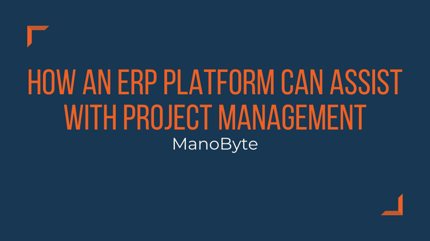How an ERP Platform can Assist with Project Management
Chelsea Carter

Enterprise resource planning (ERP) is a method for handling everything that’s involved in delivering a product to the customer. Cloud-based ERPs are connected by a single database, which your team can access anywhere in the world. By using an ERP, your team is able to increase the flow of data between departments and create more opportunities for automating systems and processes. By connecting all departments together, companies experience better communication and easier collaboration.
ERP software can be used in:
- Financial sectors
- Retail sectors
- Construction
- Manufacturing
- Healthcare
- Education
- Warehouse Management
- Sales and Marketing
- Back-office functions
What is Project-Based ERP?
Project-based enterprise resource planning, (project-based ERP) is a new approach to enterprise software that’s helping companies change the ways in which they utilize IT. Building on traditional ERP concepts, project-based ERP expands the capability of ERP tools beyond production and into systems that help business leaders plan and complete projects.
How is Project-Based ERP Different from Traditional ERP?
Traditional ERP systems focus almost entirely on manufacturing and accounting, while project-based ERP software provides end-to-end solutions for project-based companies. Traditional ERP systems are an excellent option for manufacturing businesses with uncomplicated processes because they offer the necessary tools to manage straightforward production and finances.
In contrast, project-based ERPs provide the comprehensive analysis needed to be highly competitive and the capability needed to manage complex tasks within one system. Additionally, because so many different functions are managed by a single system, project-based ERP can collect and analyze data on all a company’s processes. This enables managers to track metrics surrounding labor costs, customer retention, and inventory turnover.
Project-Based ERP Uses
Finding & Winning Customers
ERPs, especially when combined with a CRM, help construction companies manage customer relationships and identify potential projects. Companies can also increase their chances of winning projects by monitoring sales performance, standardizing successful sales techniques, and ensuring repeat business.
Managing Bids
ERPs can be customized with bid management software, which allows companies to track and analyze their bids. Additionally, integrated project estimates can be created to track changes made throughout the estimating process.
Planning Ahead
During the planning process, project managers look ahead at company-wide resources to effectively plan project schedules. Using dynamic timelines, managers can view timeline resources across the entire organization. Additionally, they are able to view skills and tasks that must be completed, which can help aid human resource planning.
Finances
Controlling Cost
Accounting systems and back-office processes are the foundation of your business. Having proper and responsive financial tools can help expand your organization while reducing costs. ERP software offers a set of accounting tools that you can integrate with your current financial systems, including:
- Shareable analytics
- Audit trails
- Past invoices and transactions
- Ability to automate regular transactions
Managing People
ERPs, when combined with a CRM or PRM system, create a master database where you can combine all employee information, including profiles, time cards, payroll, and administrative data. For project based ERPs, this allows you to easily manage your team and track labor requirements.
Protecting Your Assets
Timing is everything in project asset management. NetSuite uses cloud technology so that all data can be accessed in real-time, which means you can monitor and allocate your assets.
Benefits Of A Project-Based ERP
- Improved inventory management
- Fast and transparent purchasing
- Tighter compliance control
Managing Risk
ERPs provide corporate risk management tools to protect against risk by tracking compliance with state, national, and international regulations. Financial professionals are able to track and create audit trails in a central database to ensure accounting regulations are being implemented.
What are the Features of Project-Based ERP?
Project-Based Accounting
Project-based accounting allows users to see the financial state on a project level. Using modular tools, your accounting staff is able to record costs and revenues associated with different projects on a daily basis, in turn, making your financial reporting more useful and efficient.
If a project isn’t hitting milestones on time, you can quickly look into your project-based accounting records and see if this project has been under-resourced. Additionally, you are able to change how assets and costs are allocated based on the financial health of a project. Financial professionals are able to set custom alerts and dashboards to help gauge financial health of multiple projects.
Human Resource Management
Additionally, project-based ERP consists of recruiting, training, payroll, and time tracking and attendance tools. Managers are able to understand various trends related to employees, hours, and regulations. These trends can be depicted in a number of ways, including visual reports such as graphs and charts.
Having the ability to access real time information allows workflows to be created for specific projects. This visibility is incredibly useful to prevent a business from taking on too many new projects when your resources are tied up, while also reducing periods of low productivity.
Collaborating with Project Stakeholders
Communicating with stakeholders is critical to managing projects. Traditionally, communication with stakeholders involves printing reports and managing a variety of databases that must be faxed over for security reasons. With an ERP, your information is seamlessly shared on a cloud real-time. Managers and stakeholders can create daily reports, automatic emails, and custom alerts to manage key information. ERPs are also in compliance with federal and state laws, ensuring security practices are followed.
ERPs are useful tools to help a business automate their back office operations. NetSuite allows modules to be added to their ERP systems, allowing you to customize your project-based ERP to meet your unique needs. ManoByte is experienced at implementing and customizing ERPs to match our clients goals. By partnering with us, we are able to leverage PRM, CRM, ERP, and inbound tactics to ensure your marketing, sales, and operational efforts are properly executed. Contact one of our Business Growth Consultants to see how we can help develop your business.


